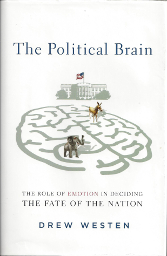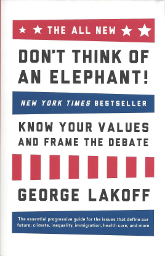|
The ideas brought from academic research into public discussion by these principals are supplemented by others on the Links/Tools and Articles pages.
 |
2007: The Political Brain is a groudbreaking investigation into the role of emotion in determining the political life of the nation. For two decades Drew Westen, professor of psychology and psychiatry at Emory University, has explored a theory of the mind that differs substantially from the more "dispassionate" notions held by many cogitive psychologists, political sciientists, economists—and Democratic campaign strategists. The idea of the mind as a cool calculator that makes decisions by weighingh the evidence bears no relation to how the brain actually works. When political candidates assume voters dispassionately make decisions based on "the issues," they lose.... |
 |
2012: The Little Blue Book is the best compact explanation in years (133 pages plus endnotes) of how to apply cognitive science in our political language--especially the first 43 pages. BUY it. Study it. Absorb it.
AND "The Little Blue Blog" is a continuation of The Little Blue Book:
 |
 |
2014: Ten years after writing the definitive, bestselling book on political debate and messaging, George Lakoff returns with new strategies about how to frame today's essential issues....
The ALL NEW Don't Think of an Elephant! picks up where the original book left off—delving deeper into how framing works, how framing has evolved in the past decade, how to speak to people who harbor elements of both progressive and conservative worldviews, how to counter propaganda and slogan, and more....
BUY IT! |


|
"…Even when progressives have won important political battles, such as the defeat of efforts to privatize Social Security, they have done so largely without a coherent ideology; rather, this success rested on the public's recognition that it stood to lose its retirement security with this 'reform.' It also helped that the public was suspicious of the motives of the proponents of Social Security privatization. However, success in the goal-line defense of the country's most important social program is not the same thing as a forward looking agenda.
"The key flaw in the stance that most progressives have taken on economic issues is that they have accepted a framing whereby conservatives are assumed to support market outcomes, while progressives want to rely on the government. This framing leads progressives to futilely lash out against markets, rather than examining the factors that lead to undesirable market outcomes. The market is just a tool, and in fact a very useful one. It makes no more sense to lash out against markets than to lash out against the wheel.
"The reality is that conservatives have been quite actively using the power of the government to shape market outcomes in ways that redistribute income upward…."
-- From the Preface, The Conservative Nanny State, by Dean Baker (2006) (free download)
(bold type by the editor)
|

|
This source is important enough that it's in two places (also under "Articles"), so you won't miss it:
"There are four essential American stories. The first two are about hope; the second two are about fear...."
 "Story Time: The Lost Art of Democratic Narrative." By Robert Reich, The New Republic, March 28, 2005. (This article is not easily found online, so copies in two formats are archived on this site: reformatted magazine image) "Story Time: The Lost Art of Democratic Narrative." By Robert Reich, The New Republic, March 28, 2005. (This article is not easily found online, so copies in two formats are archived on this site: reformatted magazine image)
|

"Beyond Red vs. Blue: Political Typology"
Pew Research Center for the People & the Press
Released May 4, 2011 |
| This report is based on opinions on a wide range of issues, and those can provide some insights. But it remains for us to look for the values that underlie those opinions. Some candidates may look at the report, note the differences of opinion AMONG Democrats and AMONG Democratic-leaning Independents, then try to avoid talking about those issues for fear of alienating ANY voters. That would be a seriously wrong conclusion, as the materials in this website make clear. |

The Shock Doctrine: The Rise of Disaster Capitalism, by Naomi Klein, was published in 2007. To understand the ultimate goals of laissez-faire capitalism (capitalism with no rules, distinct from the regulated capitalism in the U.S.), the damage inflicted internationally where it has been imposed, and its fundamental conflict with democracy, read comments on the book here, then read the book.
An example of and one response to the ideological assault described in The Shock Doctrine lies in an article by Naomi Klein, "Capitalism vs the Climate" in The Nation, 11/28/2011 edition. (A PDF version that you may mark up is here.) |
|


